A few weeks ago, I caught the last show of
Mendi + Keith Obadike's astonishing new opera-masquerade,
Four Electric Ghosts, at
The Kitchen in
New York City. These two never cease to amaze me. For this show, which also included breakout performances by poets-performers
Natasha Latasha Diggs, Karma Mayet Johnson, an incredible band, and four of the flyest dancers I've seen in a while, Mendi + Keith started with Nigerian novelist
Amos Tutuola's
My Life in the Bush of Ghosts and combined it playfully with their take on
Pac-Man, the iconic videogame (everyone remembers this, right?) to create a profound and joyful experimental, experientially multimedia extravanganza. They even beckoned people out of their seats to dance at the end, making the event truly interactive.* The opera-masquerade's narrative, essentially an updated fable, involved the three singer-sayers, Mendi, Natasha and Karma, bounteously afroed and futuristically and funkily attired, relating by text and song the story of four sisters, played by the four superbly lithe dancers, who were schooled by their mother and who died after a lightning strike, sending them to the Land of Ghosts, from which each eventually ventured out, thus generating the narrative. Blessed with knowledge, gifts and protective chalk, each Ghost sister, bearing a differently colored series of metallic stripes across her suit, encountered a scenario in which she dealt with a dangerous "mortal" and forgot, temporalily, or failed to register the mother-lessons of her previous life, and had to return home chastened but also recharged by the experience and revitalized by the recognition of what she'd previously learned. It's difficult to convey how seamlessly this all flowed together: the narrating and singing, the dancing, the light displays and projections on the back wall, the musicians' riffs, the complex weave that just keep pulsing with energy and brilliance and depth in a way that I, no huge afficionado of theater and musical performance but no stranger to them either, rarely have witnessed. And it was so grounded in a range of black cultural traditions while also feeling so
new.
In addition to the Mendi + Keith and the singer-speakers I mentioned, other collaborators included
Angela’s Pulse Performance Projects, comprising choreographer
Paloma McGregor, stage director
Patricia McGregor, and dancers
Maria Bauman, Catherine Denecy, Marjani Forte and
Keisha Turner, and design by
Kate Cusack (costumes),
Yuki Nakajima (animation/projection),
Alexandre Delaunay (scenery), and
S. Ryan Schmidt (lighting). After the performance Keith introduced me to bassist and producer
Melvin Gibbs, with whom he, Mendi and musician
Guillermo E. Brown had composed the music, which Keith, Brown, pianist
Shoko Naga, and bassist
Keith Witty performed live.
In addition to the unforgettable orchestration, songs and singing-saying (though not
Sprechstimme), and choreography and dancing, what powerfully struck me was how Mendi + Keith had rethought and tinkered with Tutuola's powerful story and its implications for our current post-modern, hyperwired, digital moment, making it as much a vision about new ways of thinking about living and learning and a vivid, veritable (afro-diasporic-)futurist parable, grounded in the stories of these women--the ghosts and the singer-speakers--as a rereading and renovating of the past. I know they were recording it (and it was also simulcast via the Web, I believe), so I hope that it's available for many more people to see soon, and I also hope that Mendi + Keith follow their precedent of issuing the tracks online in mp3/CD/DVD form. I'm telling you, these tracks were hot, and while I know Mendi is bursting with talent and have heard both Natasha and Karma sing, working with Keith and his combo in songs with richly remixed R&B, house, Afropop, electronica, rock, and hiphop flavor, they set it off individually and as a trio. You have to hear them. I certainly want to again, because this was one of the freshest and most interesting performances I've caught in years (and that includes another recent favorite,
Passing Strange).
*(I was fortunate enough not only to leave my seat, but to be bopping with
Tracie Morris (I swear!), while
Myronn Hardy and others were stepping only a few feet away. As
George Lewis watched from the front row. Where else are you going to have an experience like this?)
Here are a few (blurry--my apologies) photos from the event:

The three Singer-Sayers, Natasha Latasha Diggs, Karma Mayet Johnson, and Mendi Lewis Obadike (left to right)

The Electric House

At the end of
Four Electric Ghosts, Mendi at left, Karma at center
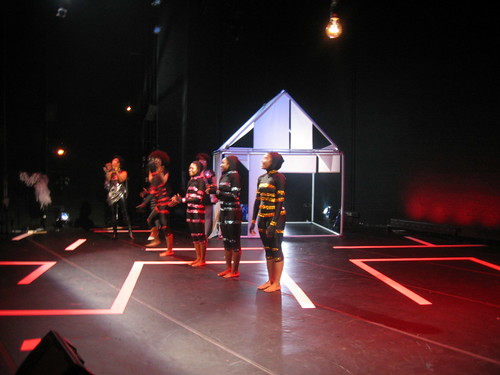
Curtain call

Mendi after the performance
**
Though I was feeling down and crappy earlier in the day, on Friday evening I dragged myself out to a reading by four major established and emerging Italian poets,
Maria Attanasio, Giovanna Frene, Marco Giovenale and
Milli Graffi, at
Think Art gallery in
Wicker Park. Poet, critic and translator
Jennifer Scappettone organized this event, part of a two-city, four event
Italian Poetry Festival, in conjunction with
Litmus Press and its wonderful journal Aufgabe--whose issue #7 included a special section on contemporary Italian poetry edited by Jennifer, entitled "Embargoed Voices: Poesia Ultima/Italian Poetry Now--and the Poetry Center's
Francesco Levato and UIC's
Chris Glomski. (Other sponsors include
Poets House, the Italian Cultural Institute of New York, St. Mark's Poetry Project, University of Chicago Arts Council and Departments of Romance Languages and Creative Writing, and the
Northwestern University Department of French and Italian.) Each of the poets read in Italian, with Jennifer reading hers and others translations, presenting work that was often striking in its innovation and political engagement, after which they engaged in a conversation led by Jennifer that touched upon questions of the poets' respective "generations," politics and
Silvio Berlusconi, and American vs. European aesthetic influence. One of the highlights was the exchange in which Milli Graffi suggested that whereas she had been surer of her place in the literary world in the past she now felt "lost," and suggested that Marco Giovenale's generation--1968 to 1978, as he defined was, in
Gertrude Stein's famous comment to
Ernest Hemingway, also a "lost generation," a appraisal to which both he and Giovana Frene, also a young poet, challenged vigorously. Afterward I had an opportunity to meet all the poets and chat about contemporary literature, and even show Maria Attanasio and her husband my poetry month blog featuring her, for which Jennifer supplied me with the requisite Italian. Now I need to learn enough to read her book,
Il falsario di Caltagirone, which I think means
The Forger of Caltagirone, and which has merited considerable praise. I also got to chat with Marco Giovenale and picked up several of his books, including
CDK, which is a Flarf-inspired text. Ah yes, even in Italy, they're Flarfing! When I got home, I felt 1,000 times better....
As always, a few photos:
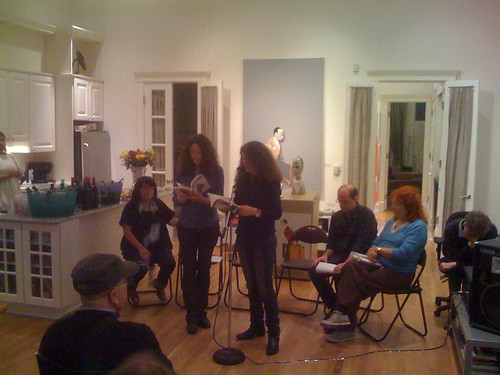
Jennifer and Giovanna Frene (R) reading in sequence
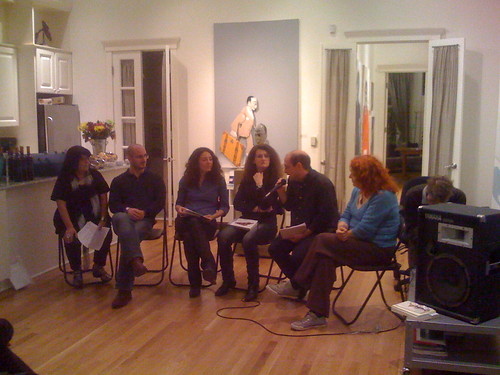
In conversation, from left: Maria Attanasio, translator and U. of Chicago doctoral student Rafaello Palumbo, Jennifer Scappettone, Giovanna Frene, Maro Giovenale, and Milli Graffi.
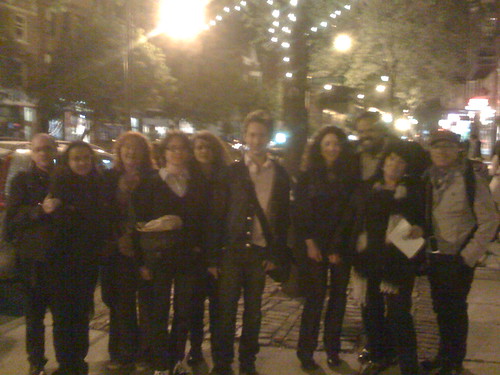
Group portrait with the poets, their loved ones and friends
***
Last night I briefly dropped by the Rogers Park salon that Loyolaites Charles Gabel and his compatriots stage every month or so to hear
Lily Brown, Lisa Goldstein, and
Nathanaël read their work. It was lively, to put it simply. The evidence:

Lily L. Brown reading her poems

Nathanaël reading from
Absence Where As***
I've been noting how much the rhetoric surrounding abortion and women's reproductive rights has been heating up crazily of late. It bubbled up into a full scale imbroglio surrounding
President Barack Obama's invitation to receive an honorary degree at the
University of Notre Dame. (As we all know by now, Notre Dame thankfully didn't rescind its invitation; the President spoke; and according to polls and despite some of the browbeating bishops, most
Roman Catholics in the country,
Indiana, and at Notre Dame supported the invitation; yet the media couldn't stop itself from stoking the controversy and extrapolating broader Roman Catholic opinion from the likes of the odoriferous
Bill Donahue). In fact, the strident tenor of the abortion discussion has been reminding me of the period in the late 1980s and 1990s when anti-abortion fanatics, led by
Operation Rescue and similar organizations, staged wide-scale public protests and took to targeting and killing doctors who performed abortions. Nevertheless, it was still surprising and horrifying to hear today about the murder in Wichita, Kansas of
Dr. George Tiller, 67, a women's reproductive health specialist who was one of the few doctors across the country providing late-term abortions. Tiller was shot dead as he was serving as an usher in the foyer of his church,
Reformation Lutheran Church. Authorities have apprehended the suspect, an anti-abortion fanatic named
Scott Roeder, 51, from a Kansas City suburb. This wasn't the first attack on Tiller; his clinic was firebombed in 1985 and he survived a shooting, in both arms, in 1993. In addition to increasing security at his clinic he frequently wore a bullet-proof vest. He also had survived repeated legal attempts to close down his clinic.
President Obama quickly issued a statement saying that he was "shocked and outraged" by the murder and condemning the turn to "heinous violence," and Operation Rescue has reportedly denounced it, as have some other high-profile anti-abortion commentators. But former Operation Rescue head
Randall Terry responded by calling Tiller a "mass murderer," and on some right-wing message boards, posters have been celebrating what amounts to an assassination. Why do I call it that? Because while I don't watch
Fox News Channel if I can help it, you can trace a line of authorization and legitimation of this horrific act back right-wing social agitator
Bill O'Reilly. He actually authored and uttered the following statement: "
If we allow Dr. George Tiller and his acolytes to continue, we can no longer pass judgment on any behavior by anybody. What Tiller is doing is that bad. And that's the Memo." [H/t to comments on Brad Blog.] That verges on incitement to me. O'Reilly's comments aren't the only ones of this sort, and he may not have directly urged Roeder to act, his and others' extremist rhetoric has played a role in fomenting rage and raising the stakes among right wingers; the nutcase
who went on a murderous rampage in Knoxville last year had cited a guest on O'Reilly's show as an inspiration, and he wasn't the only one. It will be interesting to see whether Fox News addresses this issue (doubtful) or if the legacy media, who have in the past used right-wing frames ("pro-life" etc.) and repeated conservative cant on abortion without any apparent awareness of what the affects of doing so might be, addresses the stridency of the anti-abortionist rhetoric and their role, even if inadvertent, in advancing it.
It's important also to note that this murder occurs at a time when safe, legal and affordable abortions for women across the country are far less available than they were 25 years ago. Under both Republican and Democratic administrations and Congresses, we've witnessed a steady assault on
Roe v. Wade and a steady erosion in unimpeded access to clinics. The days of Bill Baird centers or public hospitals performing abortions are long gone. Federal and state laws have made it harder for women in some parts of the country to get an abortion at all. These assaults have occurred alongside the increasing lack of universal, affordable health care for all and the relentless promotion and inculcation of failed "abstinence education" in elementary schools and public health programs, both domestically and abroad. (
Bristol Palin is the most recent high-profile poster-child for the last issue.) Yet for doctrinaire anti-abortionists, whose behavior points both to sexism in its desire to control, restrict and limit women's rights and classism in its desire to control, restrict and limit poor and working class women's rights to knowledge, information and access (upper-middle-class and rich women can undergo abortions whenever they see fit), this sorry state of affairs is still unacceptable. They are determined to control and limit women's reproductive rights--not just the "choice" to have an abortion but basic and free access to knowledge and information about human sexuality, as well as to contraception and abortion--and personal autonomy, autonomy over their own bodies, even further, and they evidently so fear the new administration's babysteps around, as opposed to back from, this present dreadful state of affairs that some of their adherents are resorting to the sorts of terrorist attacks the country witnessed two decades ago. While I applaud the Attorney General's decision tonight to post federal marshalls at some reproductive health clinics that provide abortions, far more important will be for the administration, the media and entertainment industry--which has been complicit in where we've ended up, since mainstream films and TV shows have tended
not to deal truthfully or candidly with human sexuality, unplanned and unwanted pregnancies, and abortion--along with the rest of us addressing the broader problems of which this murder is only a terrifying symptom.
UPDATE: from The American Prospect: Ann Friedman's take: "Why Clinic Violence Is Obama's Problem"




















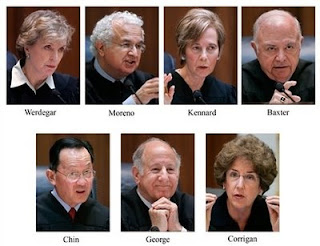 By now the dreadful news from California is widely known: by a vote of 6-1, the
By now the dreadful news from California is widely known: by a vote of 6-1, the 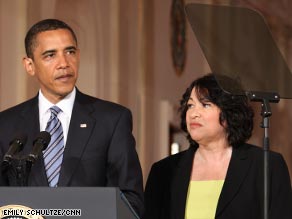 Somewhat counterbalancing this awful news was the announcement yesterday morning of
Somewhat counterbalancing this awful news was the announcement yesterday morning of  On a better literary note, congratulations certainly must go to a writer whom it required maturity for me to appreciate,
On a better literary note, congratulations certainly must go to a writer whom it required maturity for me to appreciate,  Often I'll come across something in one of the papers I regularly scan and note it for a future blog post on here, only to not get around to it because of one thing or another, but I can always count on Reggie to buzz me with an email that gets me thinking. He recently sent links to two articles I'd seen, on
Often I'll come across something in one of the papers I regularly scan and note it for a future blog post on here, only to not get around to it because of one thing or another, but I can always count on Reggie to buzz me with an email that gets me thinking. He recently sent links to two articles I'd seen, on 















